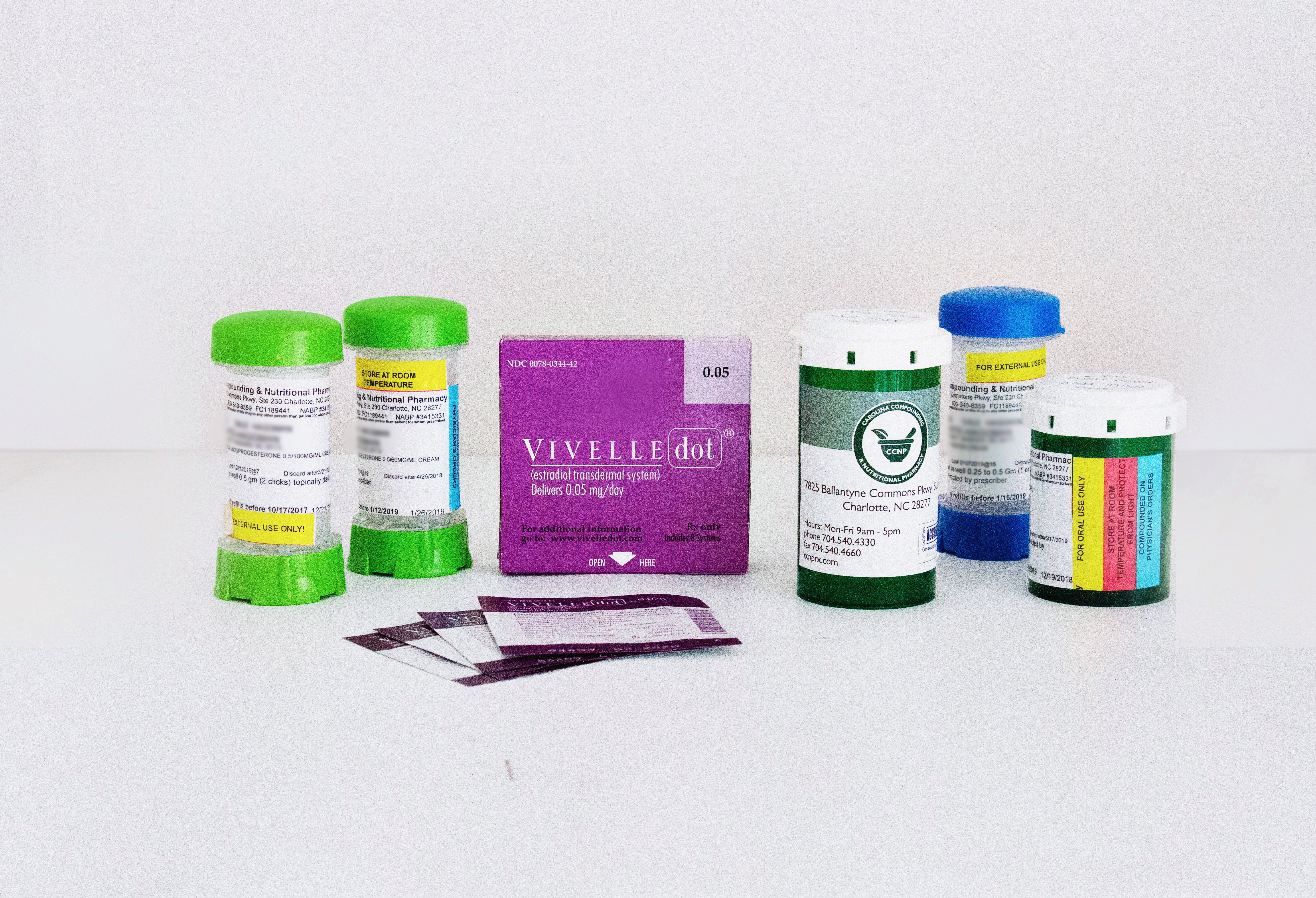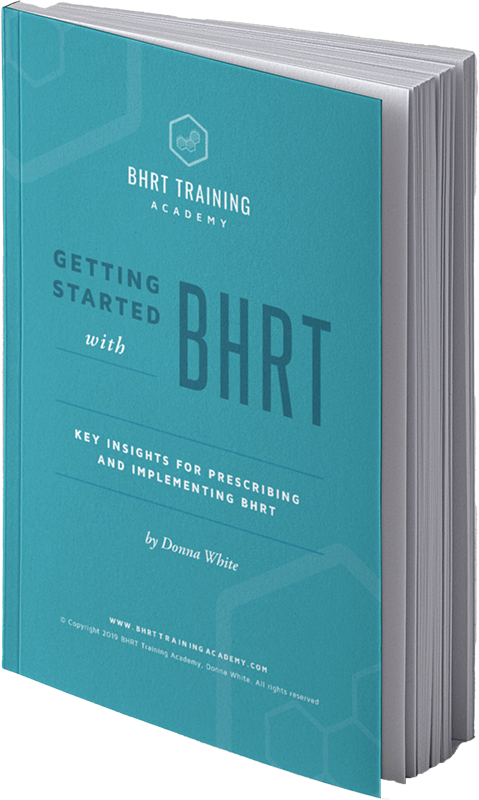5 Reasons You Should Learn to Prescribe Bioidentical Hormones

Do you know why you should prescribe bioidentical hormones to your patients?
There are five important reasons.
As their trusted health care provider, it’s your duty to have their best interests in mind and to help them with any symptoms they may be presenting. It’s your responsibility to keep them healthy.
Just as importantly, your patients need you to be educated and knowledgeable about how to prescribe bioidentical hormones properly, and to clear up all the confusing information they will find online.
To help you best determine what course of action is best, here are five specific reasons you should prescribe bioidentical hormones.
Would you like to learn more about starting your own BHRT practice? Click here to schedule a strategy call now, and be ready to start in as little as eight weeks.
#1 Reason to prescribe bioidentical hormones: your patient is symptomatic!
Over 55 million women in the US are currently experiencing menopause.
That is a lot of hormonal women! As you know, these women struggle with so many symptoms. They have hot flashes, they can’t sleep or lose weight, their moods are haywire, and they struggle to remember words. Also, they are tired and frustrated about rapid skin aging. They will live the last 1/3 of their life in post-menopause.
Even before they stop having their menstrual cycle, your female patients are struggling with perimenopausal symptoms. Seventy to eighty percent of women complain about PMS symptoms and also have menstrual periods that are painful, excessively heavy, or otherwise hard to manage.
Not to mention (ok I will mention) in my estimation, 90 percent of the thousands of hormone lab tests I have read show stress hormone (cortisol) imbalances. As you know 75-90 percent of visits to medical providers are due to stress-related ailments.
#2 Reason to prescribe bioidentical hormones: suboptimal hormone levels coexist with disease
The second reason you should prescribe bioidentical hormones when indicated is that suboptimal hormone levels coexist with or can contribute to disease. Diseases that are affected by hormonal levels include but are not limited to the following:
- Cardiovascular disorders
- Neurological disorders
- Gastrointestinal disorders
- Systemic conditions such as diabetes
- Autoimmune diseases
#3 Reason to prescribe bioidentical hormones: diseases increase when hormones decrease
The third reason you should evaluate your patients’ hormones and prescribe bioidentical hormones as indicated, is that as hormone levels decline diseases increase.
Hormones such as estradiol and testosterone for example, are anti-inflammatory.
Inflammation affects as much as 90 percent of chronic diseases, including heart disease, Alzheimer’s, diabetes and cancer.
Since hormones are neuroprotective, declining levels contribute to cognitive decline and increased risk of Alzheimer’s and dementia. It can also lead to decreased bone density.
#4 Reason to prescribe bioidentical hormones: HRT is supported by scientific evidence
Published trials on HRT or ERT demonstrate:
- Reduction on all-cause mortality
- Reduction in Alzheimer’s disease by 30 – 50%
- Prevention of CAD via numerous mechanisms
- Reduces cardiovascular morbidity
- Reduces risk of MI
- Prevention of colon CA
- Prevention of Osteoporosis
- Prevention of Age Related Macular Degeneration by 90%
- Reduction of deaths from MI and Breast Cancer
- No increased risk of CA (except synthetic progestins)
- No increased risk of thromboembolism
- No increased risk of stroke
*See citations below.
#5 Reason to prescribe bioidentical hormones: high demand, outstanding patient response and practice growth
The last reason you should learn to prescribe bioidentical hormones is actually a list of several important considerations.
- Hormones have many critical non-reproductive functions that support our health.
- HRT has been shown to increase longevity.
- Optimal levels of hormones improve the quality of life for your patients.
- Patient response to BHRT and restoring hormone balance is outstanding.
- Offering BHRT supports practice growth.
Bioidentical HRT is truly one area of your practice that your patients will notice great symptomatic improvement. When you prescribe bioidentical hormones, you are helping your patients sleep better, eliminating night sweats or hot flashes, and alleviating mood issues like hormone induced anxiety or depression.
These changes can be truly life-changing for your patients. They will find that their relationships will benefit, and their ability to function in their careers will improve as well.
This will help to grow your practice because they will share these amazing effects with their friends and colleagues.
There still aren’t enough BHRT providers to meet current demand. It is in your patients’ best interest, as well yours, to learn this life-changing, health promoting modality.
Enjoyed this article? Here are three more to help you:
How to get started: Four key components of comprehensive BHRT training
What happens when women age?
Thinking about starting a BHRT practice? 7 things to consider
This article has been updated from a previously published version.
*Citations
EVIDENCED BASED BENEFITS OF HRT AND ERT
Reprinted from, HORMONES And Bioidentical HRT Prescribing Manual, by Donna White
Cardiovascular
“The reduction in incidence of clinical ischemic eventshas been substantial ranging from 30% to 90%. HRT alters the biology of the vessel wall, causes vasodilation and provides anti-inflammatory benefits, reducing heart attacks.” New England Journal of Medicine2000; 343(8):572-574.
“HRT also causes sustained increases of nitric oxide levels and reductions in norepinephrine, plasma renin activity and endothelin. These endothelial changes have been associated with vasodilation, reduced blood pressure, increased blood flow and improved cardiac performance.” J Gen Intern Med 2004; 19 (7): 791-804.
Alzheimer’s
“Our findings, along with other recent work, suggest that HRT may be effective for the primary prevention of Alzheimer’s Disease-if not for its treatment”. JAMA2002; 288:2123-2129.
“Human neuroimaging studies provide evidence that estrogen containing hormone therapy influences the pattern of brain activation during memory processing…Findings from a number of case-controlled studies and 2 prospective investigations suggest about a 30% reduction (of Alzheimer’s Disease, added) in women who report ever having received hormone therapy compared to nonusers.”
Resnick S., JAMA2002; 288: 2170 (editorial).
“As in the previous studies, the adjusted risk of incident AD among lifetime HRT users was reduced to little more than half that among nonusers.” JAMA2002; 288: 2123-29.
Bone Density /Diabetes
“Hormone replacement has beneficial effects other than cancer and cardiovascular disease, such as a 35% decrease in hip fractures, 35% decrease in new onset diabetesand a 60% decrease in recurrent urinary tract infections. “J Gen Internal Medicine 2004:19(7): 791-804.
Mortality
“Pooled data from 30 trials, with 26,708postmenopausal women followed for a mean duration of 4.5 years, indicate that hormone replacement does not increase total mortality.” J Gen Intern Med 2004; 19 (7): 791-804.
Central Obesity/BMI
“In women with diabetes mellitus, HRT reduces central adiposity and improves glycemic controland physical functioning.” J Gen Intern Med 2004; 19 (7): 791-804.
“Hormone replacement therapy in postmenopausal women and testosterone replacement in older men appear to reduce the degree of central obesity.” Obesity Review 2004 Nov; 5(4): 197-216.
“Age-adjusted comparisons indicated intermittent and continuous hormone users had significantly lower mean BMIs at baseline than women who never used hormone replacement therapy.” JAMA1996; 275(1): 46-49.
BENEFIT OF ESTROGEN REPLACEMENT
Cognitive
“Multiple medical studies have demonstrated estrogen’s protective effects against Alzheimer’s, memory loss, loss of cognition. Estrogen decreases colorectal cancer, cataracts, macular degeneration, prevents tooth loss and gingivitis, and prevents urogenital atrophy, painful intercourse and stress incontinence.”
Biomedica Jan 2000; Vol. 3(1):6-9.
Cardiovascular
“Estrogen therapy alters the biology of the inner vessels (of the heart). Hormone replacement therapy protects through vasodilation, anti-inflammatory and anti-proliferative effects, providing significant coronary artery benefits.” NEJM2000; 343: 572-574.
“Current estrogen use is associated with a reduction in the incidence of coronary heart disease as well as in mortality from cardiovascular disease.”NEJM1991; 325: 756-62.
“In addition to potentially beneficial vascular effects of ERT, well established lipid alterations with oral ERT include favorable reductions in low-density lipoprotein (LDL) cholesterol and lipoprotein(a) and increases in high-density lipoprotein (HDL) cholesterol.” AHA Scientific Statement. Circulation 2001; 104: 499-503.
“Fibrinogen, plasma viscosity, plasminogen activator-1, tissue plasminogen activator, insulin sensitivity, homocysteine and markers of platelet aggregation and endothelial cell activation are favorably affected by estrogen therapy.” Circulation 2001; 104: 499-503.
“Moreover, estrogen inhibits intimal hyperplasia, promotes angiogenesis and has antioxidant properties.” Circulation 2001; 104: 499-503.
“There is an impressive, large collection of biological data and observational studies indicating that postmenopausal HRT protects against heart disease and stroke. There is good reason to believe that the full impact of estrogen’s beneficial actions on cardiovascular tissue requires the presence of healthy endothelium (normal blood vessels). It is most appropriate to prescribe hormones to post-menopausal women to protect against cardiovascular disease. Vascular biologists are convinced of estrogen’s essential role in protecting against cardiovascular disease. Estrogen’s role is protecting against the development of atherosclerosis.”Circulation 2001; 104:499-503.
Bone Density
“In older women, a dosage of 0.25 mg/d of 17-beta-estradiol increased bone density of the hip, spine, and total body, and reduced bone turnover, with minimal side effects.” JAMA2003; 290 (8): 1042-1048.
All-Cause Mortality
A recent study done by doctors at Yale evaluated the result of this widespread reduction in HRT use in women aged 50-59 post hysterectomy. According to their calculations, estrogen avoidance may have led to as many as 90,000 preventable deaths and breast cancer in these women. According to the authors: “Estrogen therapy in younger postmenopausal women is associated with a decisive reduction in all-cause mortality.”Philip M. Sarrel, Valentine Y. Njike, Valentina Vinante, and David L. Katz. The Mortality Toll of Estrogen Avoidance: An Analysis of Excess Deaths Among Hysterectomized Women Aged 50 to 59 Years. American Journal of Public Health: September 2013, Vol. 103, No. 9, pp. 1583-1588.
TESTOSTERONE REPLACEMENT IN FEMALES – BENEFITS
Sexual
“Testosterone administration resulted in increased sexual activity, pleasure, and orgasm in women. There was an increase in sexual fantasies, masturbation and frequency of sex. There was an improvement in well-being and mood.” New England Journal of Medicine2000; 343:682-88.
Sexual Health / Bone Density /Cardiovascular
“Testosterone increases bone densityin women. Testosterone protects against heart diseasein women.” Journal of Reproductive Medicine 1999; 44(12): 1012-20.
“Testosterone replacement in women significantly decreases carotid atherosclerosis and cardiovascular disease.” American Journal of Epidemiology 2002;155: 437-445.
“Restoring a physiological level of testosterone to women after hysterectomy not only can improve quality of life in terms of sexual libido, sexual pleasure, and sense of wellbeing but also can build bones – and may be a key to protecting cardiovascular health.” J Women’s Health 1998; 7: 825-29.
ANDROGEN DEFICIENCY – WOMEN
“A persistent view of testosterone as the male hormone deprives many clinically androgen deficient women of effective treatment.” J Reprod Med 2001; 46: 281-90.
“Our results suggest that in the physiological range, DHEAs and androgens in women are correlated with lower risk of carotid artery disease.” J Clin Endocrin Metabol 1999; 84: 2008-2012.
“We found the lowest odds of carotid atherosclerosis for women with the highest total testosterone concentrations”. Amer J Epidem 2002; 155 (5): 437-45.
“Testosterone is an important component of female sexuality, enhancing interest in initiating sexual activity and response to sexual stimulation. Testosterone is also associated with greater well-being and with reduced anxiety and depression.” J Reprod Med 2001; 46: 291-296.
“Androgens offer positive effects on bones.” J Reprod Med 2001; 46: 281-290.

Get the quick read ebook,
Getting Started with BHRT -
Key Insights to Prescribing and Implementing BHRT.
CME's - Earn while you learn.
